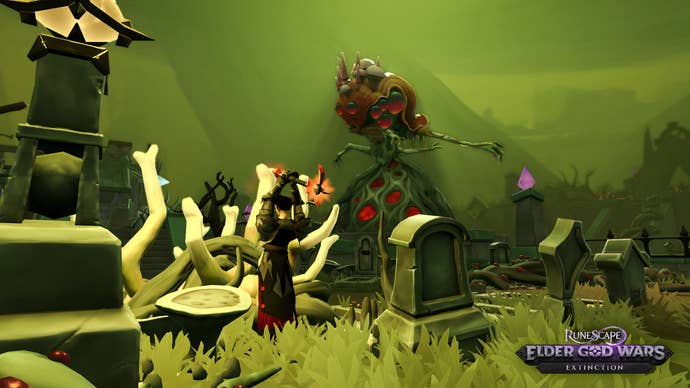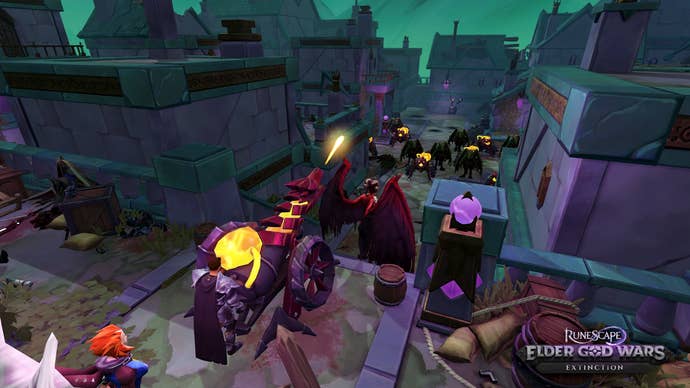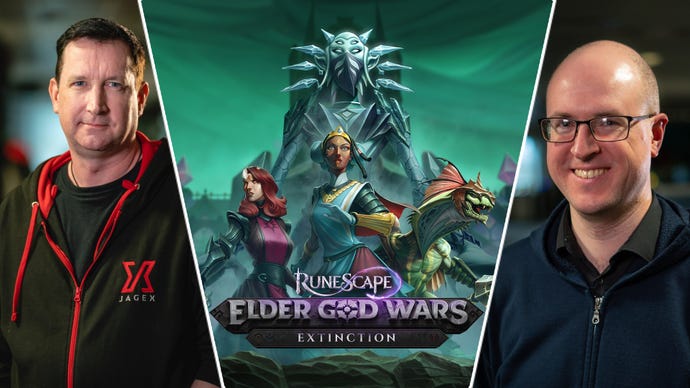"Looking at a sort of Bioware style of storytelling": The future of RuneScape beyond the Elder God Wars
We sat down with Matt Casey and Tim Fletcher to talk about how the Elder God Wars may have changed RuneScape forever.
RuneScape has been around a while, it’s fair to say. Initially emerging onto the internet way back in 2001, developer Jagex has since spawned multiple versions of its popular MMORPG that retain a permanent space on the PCs (and now phones) of a growing community of players. The latest milestone is the conclusion of the Elder God Wars saga, a series of content drops that took up the majority of RuneScape updates over the past year and brought a chain of quests to the game (alongside a fancy new dungeon) in a format unusual to RuneScape updates of the past.
With their latest big project coming to its conclusion, I sat down with product director Matt Casey and senior game designer Tim Fletcher to talk about the future of RuneScape post the Elder God Wars, their narrative aspirations for the IP, and RuneScape’s future outside of the MMO.
How has the community received these quests in comparison to some of the non-narrative updates in recent months/years?
M: If you look at the last year, we’ve seen more buzz from the community. In terms of people who have been talking about RuneScape, last year was the best year we’ve ever seen. More people in the game, more people discussing it. I was really pleased to see that, especially with the staggered release schedule of the Elder God Wars.
T: We changed the way we deliver story quite a lot last year. In the past, RuneScape almost was divided into different areas. We’d release a boss, then a quest would come out that had nothing to do with that boss, then 2 years later another quest would follow up on that quest. It was scattered. Last year we focused on delivering a much more tightly paced narrative that wove through most of the content we released.
RuneScape ships quests that are unusual for most MMOs, and they appeal to most of our playerbase but not all of them. So the idea of the Elder God Wars was that the story developed through bossing updates, not just quests, in a way that appeals to other parts of the playerbase. So this finale quest that’s about to come out, rather than being a conclusion to a series of quests, it’s a finale of everything that’s happened.
What about the narrative stakes going forward? Are we going to see the momentum continue to larger threats? Or are we going back to baking cakes next update?
T: Maybe not as far as baking cakes, but we want to lower the stakes a little bit! We don’t want to raise the stakes even higher. It’s something we’ve recognised for a while, we want something that’s involved and at your level, something that can menace you.
With this focus on creating longer stories for players to experience, do you see RuneScape expanding beyond games at all?

T: My aspiration as a designer within RuneScape involved with story and lore is to get RuneScape up there with the big fantasy IPs. RuneScape is well known, but not really for its characters and lore. I’d like to get us to a place where stories play a bigger part.
Does the Elder God Wars play into that desire, having the story be a higher priority?
T: Yeah! Strong characters, strong conflicts, stories with a lot of back and forth. We want to get more involved in the politics of the humans and we’ve been looking at a sort of Bioware style of storytelling where companions and characters play a larger part.
Do you think future updates will follow the sort of format we’ve seen with the EGW quests? A more linear release schedule, with clear progression between each update?
T: Absolutely. I saw this as a kind of dry run. We’ve had to learn as we go as we’ve not had to deal with content in this way before, which has led to some really interesting teething problems like having shorter windows to act on community feedback. In the past, we’d release a quest and have a year to look at community feedback and take steps to address that, while with EGW we’ve released six updates in a row each taking a month. What we didn’t anticipate is it didn’t give us a lot of chances to respond to feedback on previous months’ quests. We weren’t used to that as a company - we work with the players and build things with them in mind.
We did end up doing that of course, addressing feedback a few months later, but it was an interesting moment when we realised we should add some dialogue to address something, but we couldn’t do it in time because the next quest is finalised.
Do you think you’ll alter this format in the future then, to provide yourself more time?
T: Yeah we need to figure out how to work with that a little bit better.
M: To me it’s the packaging of it. It’s making content and entertainment in chapters, and the concept of seasons is something we’re pushing quite heavily now as we get into more of a seasonal structure with clear beginning and end points to content. That’ll help us organise updates in a way that’s easy to get into if you’re a player coming back to the game and have maybe missed parts of it. It provides good jumping in points.
You see this a lot in other forms of content like boxsets and the Marvel cinematic universe. It works well with RuneScape, as we’ve always released content updates regularly, and our players recognise the value of common updates as part of their monthly sub.
Why take this change in direction now? The idea of seasonal content has been around for a while now - is there something about the Elder God Wars that spurred on this change in strategy?
M: It’s been trial and error for us. In the past we’ve had epic plans and sometimes those have come out in pieces. If we do that right, and we’ve got these episodes that run through a season that can be effective. However, sometimes players can feel a bit frustrated that they’re not getting the whole thing in one go. So we needed to find a good way of presenting that kind of content, and the Elder God Wars having quests unlock one by one kept people coming back. It was all about keeping the right balance between the batch releases we had in the past and the style of updates we do now.
One hot-button topic among high-end players right now is Death Cost. I imagine it’s a major part of the game’s economy as a major gold sink, but is there any progress on addressing that?
T: We have a developer assigned to that now. So we’ll be announcing when we have something to ship on that matter. But as you say, it’s a complicated system and we have to be careful about what we change. Even what we say can have a knock on effect on the economy! If we announce something and change our minds, that can have a bad effect on people’s bank value.
M: That’s the sort of thing where we’d want to be very careful with how we address that - it affects so many systems. We need to analyse the data and move carefully. There is work happening, and it will be something we want to share with our player, explain what we’re doing and why we’re doing it.
I checked some of Jagex’s financial reports on Company House, and the expansion of the RuneScape IP has mentioned as one of your goals going forward. Can we expect to seeRuneScape on other platforms, or maybe in different genres?

M: I think it’s a bit of both. We’re always looking for ways to bring RuneScape to new audiences, whether that’s bringing it to parts of the world where we’ve not pushed heavily in the past, or new platforms where it seems to work well. The challenge for us is the nature of the game, which worked well on mobile! It doesn’t work so well on a joypad! So we’d have to make some drastic changes to the mechanics of the game and the control system to support console play.
Our vision is to bring the game to as many people as we can, although that doesn’t necessarily mean bringing it to every platform that exists because it might just not work. Saying that, we’re always looking for ways to expand the RuneScape IP. That could be with more games that use the game’s lore, the franchise and the world of Gilanoor. There’s nothing we can announce on that front just yet, but we’re always looking for opportunities there.
Of course you’ve also got the Jagex publishing arm of the company which has gone out and supported the release of a few games at this point. I imagine that would be a tool you’d use for that expansion right?
M: Absolutely. We’ve seen products like Melvor Idle which came from a self-taught indie dev who was this big RuneScape fan, and we’ve been able to bring that to the rest of the RuneScape community. There are more games that we’re looking at all the time, to see if they fit the Jagex publishing lineup.
T: We have the Steamforge stuff this year, I’ve been working with them. On your point on the RuneScape brand, they’ve been keen not to ship a generic fantasy boardgame with a RuneScape logo on it, we want to ship the RuneScape boardgame. So we’ve been working closely together to create a game that fits that.


